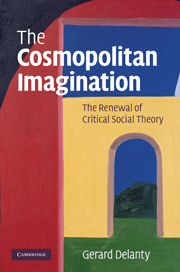Book contents
- Frontmatter
- Contents
- Preface and acknowledgements
- Introduction
- 1 The rise and decline of classical cosmopolitanism
- 2 Contemporary cosmopolitanism and social theory
- 3 Global ethics, solidarity and the problem of violence
- 4 Cosmopolitan citizenship and the post-sovereign state
- 5 Multiculturalism from a cosmopolitan perspective
- 6 Religion in a cosmopolitan society
- 7 Cosmopolitanism, modernity and global history
- 8 Cosmopolitanism and European political community
- 9 Europe as a borderland
- 10 Conclusion: inter-cultural dialogue in a post-Western world
- Bibliography
- Index
7 - Cosmopolitanism, modernity and global history
Published online by Cambridge University Press: 18 January 2010
- Frontmatter
- Contents
- Preface and acknowledgements
- Introduction
- 1 The rise and decline of classical cosmopolitanism
- 2 Contemporary cosmopolitanism and social theory
- 3 Global ethics, solidarity and the problem of violence
- 4 Cosmopolitan citizenship and the post-sovereign state
- 5 Multiculturalism from a cosmopolitan perspective
- 6 Religion in a cosmopolitan society
- 7 Cosmopolitanism, modernity and global history
- 8 Cosmopolitanism and European political community
- 9 Europe as a borderland
- 10 Conclusion: inter-cultural dialogue in a post-Western world
- Bibliography
- Index
Summary
Introduction
Cosmopolitanism is a condition or orientation that has taken a huge variety of shapes and forms. In the previous chapters it was argued that cosmopolitanism can be related to a new expressions of multiculturalism where collective identities interact as opposed to being discrete units. This dynamic, which is both interactive and transformative, captures the key to the contemporary significance of cosmopolitanism. The cosmopolitan moment occurs when cultures or collective identities interact and undergo transformation as a result. Without the transformative moment it is meaningless to speak of cosmopolitanism. But it must also be demonstrated that something has been learnt from the encounter of cultures.
Until now the context for looking at such cosmopolitan processes has been the national culture. As argued in the previous chapters with respect to global ethics, citizenship and multiculturalism, it is no longer possible to confine cosmopolitanism to the national context and, as also argued, to the West. Viewed in broader societal terms, the cosmopolitan moment occurs not only in the encounter of one culture with another, but also when the local and global interact. Although such encounters can be related to the earliest expressions of civilizational formation, it was only with modernity that this dynamic really took on an enhanced momentum and significance. Cosmopolitanism, of course, precedes the formation of modernity, but without being a product of modernity as such, it is inseparable from the cultural and political dimensions of modernity.
- Type
- Chapter
- Information
- The Cosmopolitan ImaginationThe Renewal of Critical Social Theory, pp. 177 - 199Publisher: Cambridge University PressPrint publication year: 2009

